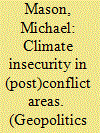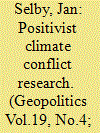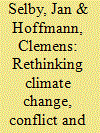|
|
|
Sort Order |
|
|
|
Items / Page
|
|
|
|
|
|
|
| Srl | Item |
| 1 |
ID:
136218


|
|
|
|
|
| Summary/Abstract |
Within the United Nations, the United Nations Development Programme, United Nations Environment Programme and Office for the Coordination of Humanitarian Affairs have all highlighted climate risks as relevant to their work in areas affected by conflict, endorsing human security approaches as valid for mapping the relationships between climate stresses and conflict-related harm. While this policy interest has limited operational presence, I discuss salient assessments of climate vulnerability in (post)conflict areas, arguing that these agencies have applied a natural disaster rather than conflict regulation inflection of humanitarian reason. The former entails a biopolitical paradigm of disaster risk reduction, prescribing technical-managerial measures to build the resilience of vulnerable populations. This framing supports a depoliticised stance reflecting UN norms of neutrality and impartiality. I claim that this position nevertheless disregards its own geopolitical conditions and effects, which dilute the scope for international humanitarian law to assign responsibility for conflict-related harm.
|
|
|
|
|
|
|
|
|
|
|
|
|
|
|
|
| 2 |
ID:
136221


|
|
|
|
|
| Summary/Abstract |
This paper is a local level examination of the political spaces and opportunities that arise for radical political agents in the aftermath of a climatic disaster. It explores the theoretical argument that disasters break the social contract between the state and disaster-affected communities by opening political space for change. The empirical work is based on a large-scale flooding disaster that affected southern Pakistan in 2010 and 2011 and caused international concern around increased Islamist mobilisation through their disaster relief programmes. The case study investigates the extent to which the climatic disaster opened political space for the radical Islamist group, the Jamaat-ud-Dawa, to mobilise. Based on fieldwork conducted in three districts of Sindh in southern Pakistan, this paper demonstrates that climatic disasters are able to impact radical politics. This connection is not linear or causal but rather very complex. It further explains why this type of inquiry is relevant in order to understand climate change and security
|
|
|
|
|
|
|
|
|
|
|
|
|
|
|
|
| 3 |
ID:
136216


|
|
|
|
|
| Summary/Abstract |
Malthus’s privileging of population growth as the main cause of poverty, scarcity and war still resonates widely in both the public policy arena and popular culture. It shapes dominant discourses about the relationship between climate change, conflict and security in Africa. This article examines what I call the Malthusian Anticipatory Regime for Africa (MARA). MARA represents the convergence of current international strategies for reducing high fertility in sub-Saharan Africa through long-acting female contraception with climate conflict narratives that blame environmental degradation on population pressure and portray young African men as a security threat. Together these serve as a powerful gendered rationale for Western humanitarian and military interventions. MARA also plays a role in justifying the new land enclosures on the continent. How can critical scholarship more effectively challenge MARA and intervene in the politics of anticipating the future?
|
|
|
|
|
|
|
|
|
|
|
|
|
|
|
|
| 4 |
ID:
136217


|
|
|
|
|
| Summary/Abstract |
This article argues that the securitisation of Africa’s environment and climate in the early twenty-first century has less to do with multidisciplinary inquiry into the complexities of climate change, development and conflict, and more with historically established paradigms of thinking about Africa, its ecosystems and notions of disorder and violence. Securitisation is the result of a specific moment in the post–Cold War era with its particular geopolitical configuration and of deeply embedded modes of imagining the African continent, its peoples and their relationship with the environments they inhabit. The main objective of this article is to historicise and politicise the prevailing dystopian discourse about climate-induced insecurity. I show that the assumptions and chains of causality that constitute today’s climate wars narrative are remarkably similar in nature to the environmental narratives that underpinned imperialist and post-independence discourses on environment and development, legitimising highly authoritarian interventions against local populations by governments.
|
|
|
|
|
|
|
|
|
|
|
|
|
|
|
|
| 5 |
ID:
136223


|
|
|
|
|
| Summary/Abstract |
Policies addressing climate change are driving major transformations in access to global land, forests and water as they create new ‘green’ markets that reinforce, and attracts the financial grid and its speculators. This leads us to examine the rise of state violence and subsequent environmental policies in forests, transferring into both ‘fortress’ and ‘participatory’ conservation, enhancing this relationship with new environmental commodity markets. We go on to document how the new and intensifying commodification of the environment associated with climate change is manifest in conflicts linked to the UN-REDD+ programme, industrial tree plantations (ITPs), and land-use practices associated with conservation and biofuels. We trace conflicts to business practices associated with land acquisitions and mining practices which claim to address climate change and mitigate ecological crises. This paper thus grapples with systemic issues of the modern industrial economy and the mechanisms legitimising and advancing the militarisation and marketisation of nature.
|
|
|
|
|
|
|
|
|
|
|
|
|
|
|
|
| 6 |
ID:
136219


|
|
|
|
|
| Summary/Abstract |
In recent years a large body of work has emerged that uses a positivist epistemology and quantitative methods to assess the likely conflict impacts of global climate change. This article advances a critique of this positivist climate conflict research programme, identifying within it three serial shortcomings. It contends, first, that the correlations identified by this research are specious, since they always rest upon coding and causal assumptions which range from the arbitrary to the untenable. It argues, second, that even if the correlations identified within this research were significant and meaningful, they would still not constitute a sound basis for making predictions about the conflict impacts of climate change. And it submits, third, that this research programme reflects and reproduces an ensemble of Northern stereotypes, ideologies and policy agendas. A departure from positivist method is required, the article contends, if we are to get close to thinking through the wide-ranging political and conflict implications of the human transformation of the global climate.
|
|
|
|
|
|
|
|
|
|
|
|
|
|
|
|
| 7 |
ID:
136215


|
|
|
|
|
| Summary/Abstract |
This special issue of Geopolitics presents a series of critical interventions on the links between global anthropogenic climate change, conflict and security. In this introduction, we situate the special issue by providing an assessment of the state of debate on climate security, and then by summarising the eight articles that follow. We observe, to start with, that contemporary climate security discourse is dominated by a problematic ensemble of policy-led framings and assumptions. And we submit that the contributions to this issue help rethink this dominant discourse in two distinct ways, offering both a series of powerful critiques, plus new interpretations of climate-conflict linkages which extend beyond Malthusian orthodoxy.
|
|
|
|
|
|
|
|
|
|
|
|
|
|
|
|
| 8 |
ID:
136222


|
|
|
|
|
| Summary/Abstract |
In the face of global climate change, strengthening community resilience becomes increasingly important, especially in conflict affected countries with fragile governance. Nepal is such a country, recovering from a decade of civil war while facing several climate and environmental risks, including floods, droughts and landslides. We aim to contribute to the understanding of resilience building by drawing on case studies from Banke, Dang and Rolpa districts in Nepal. To compare the resilience of the districts we conduct field research. None of the analysed approaches to strengthen the resilience are without unintended consequences. The provision of rice in Rolpa increases food security but also creates local preferences for rice that cannot be met sustainably. In Dang and Banke aid resources themselves have become a source of conflict. We conclude that a more holistic understanding of local realities is needed to minimise unintended effects and strengthen resilience under challenging governance and (post)conflict conditions.
|
|
|
|
|
|
|
|
|
|
|
|
|
|
|
|
| 9 |
ID:
136220


|
|
|
|
|
| Summary/Abstract |
Climate change has been successfully represented as a security concern to such an extent that it is firmly established on the political agenda, even though the implementation of concrete policies is disputed. In this paper, we develop an analytical framework to better trace the process of securitising climate change and assess its normative implications. We establish a typology of six climate security discourses on the basis of two dimensions: three levels of referent objects and two logics of securitisation, one that corresponds to the original Copenhagen School framework and one where the threat takes the form of the invocation of risk. We find that there are significant differences in the relative importance of the resulting climate security discourses in Germany and the US, but that normatively, all discourses come with their own problems, which calls for more detailed scrutiny and assessment of climate security discourses and their political effects.
|
|
|
|
|
|
|
|
|
|
|
|
|
|
|
|
|
|
|
|
|